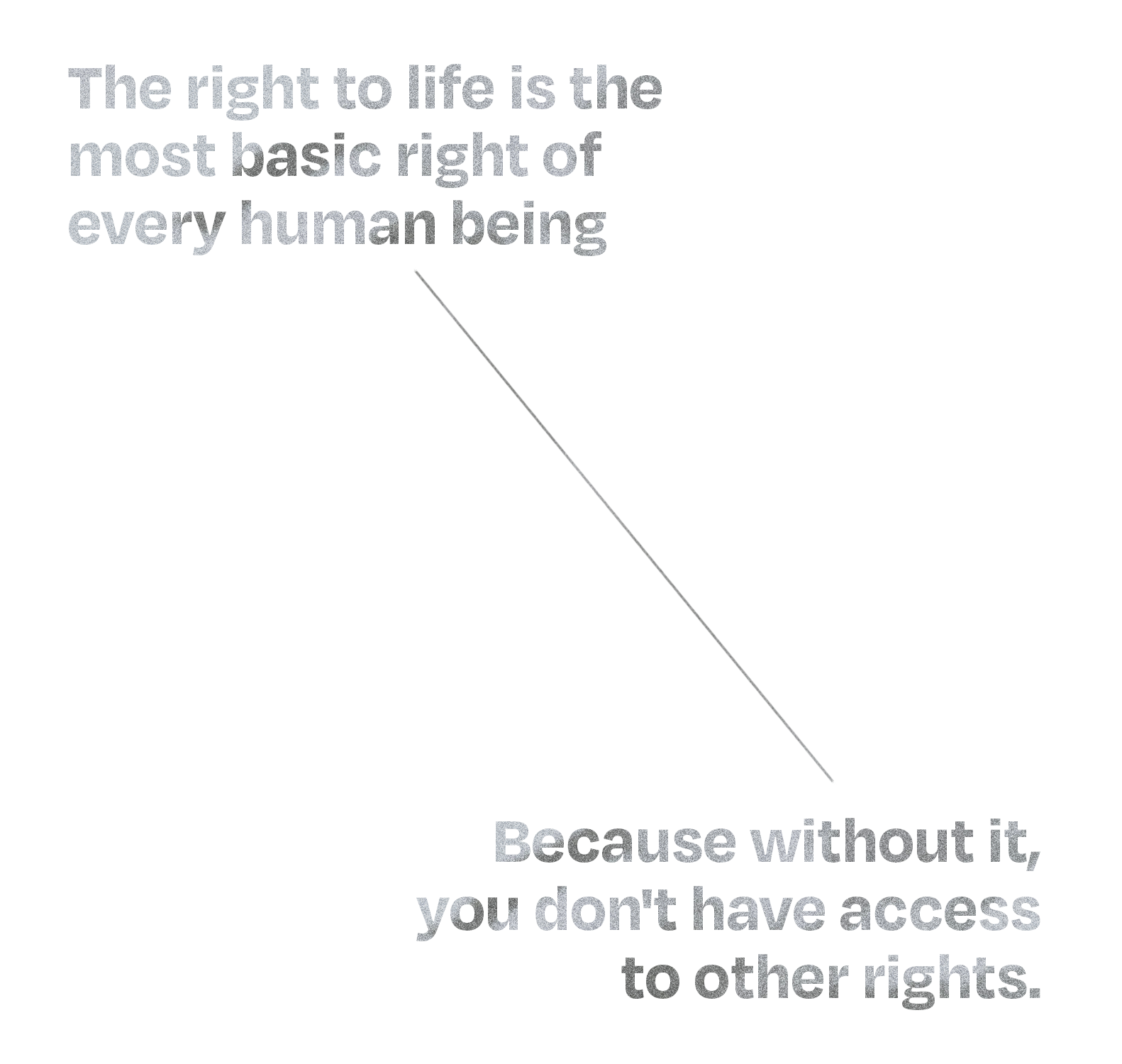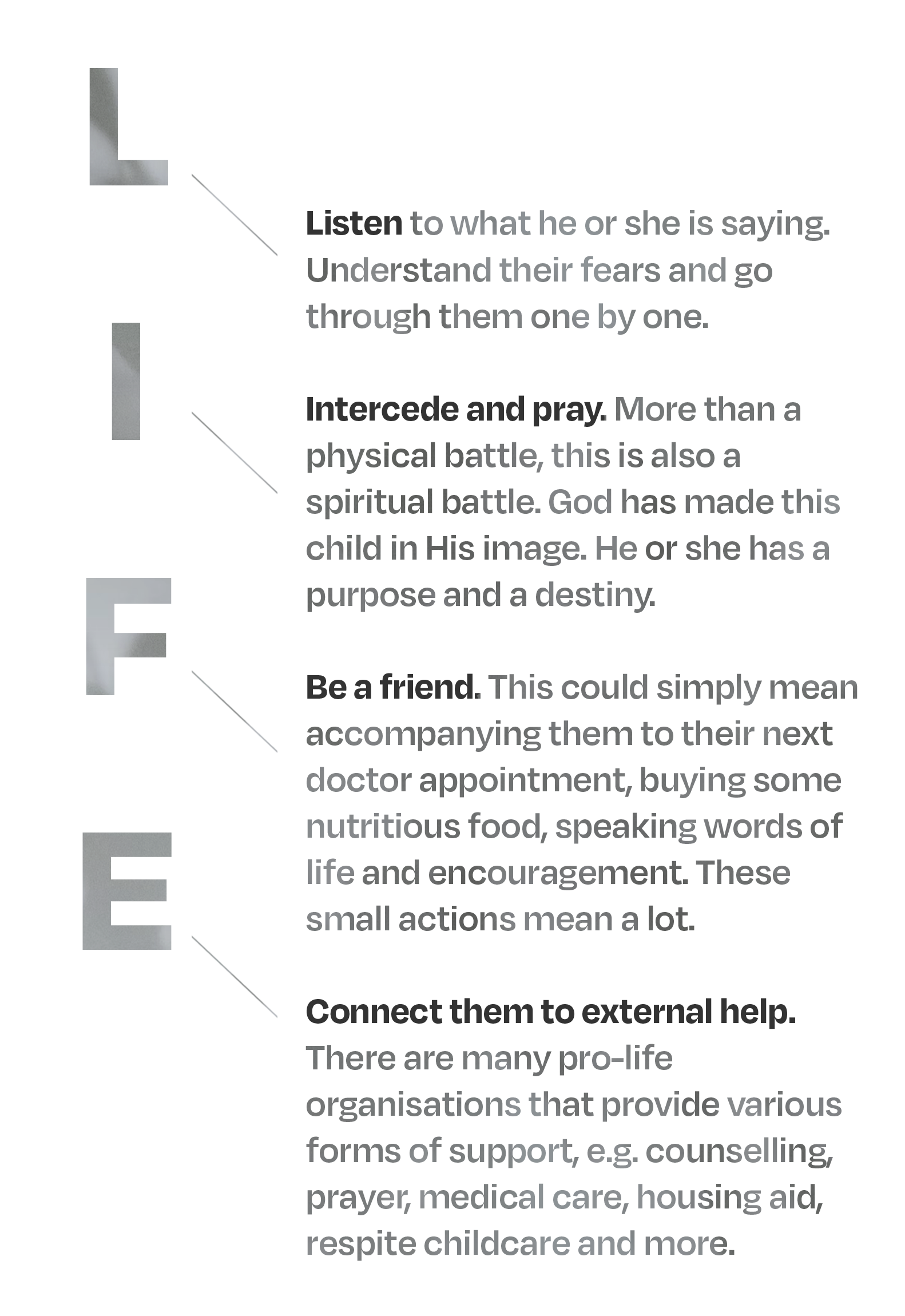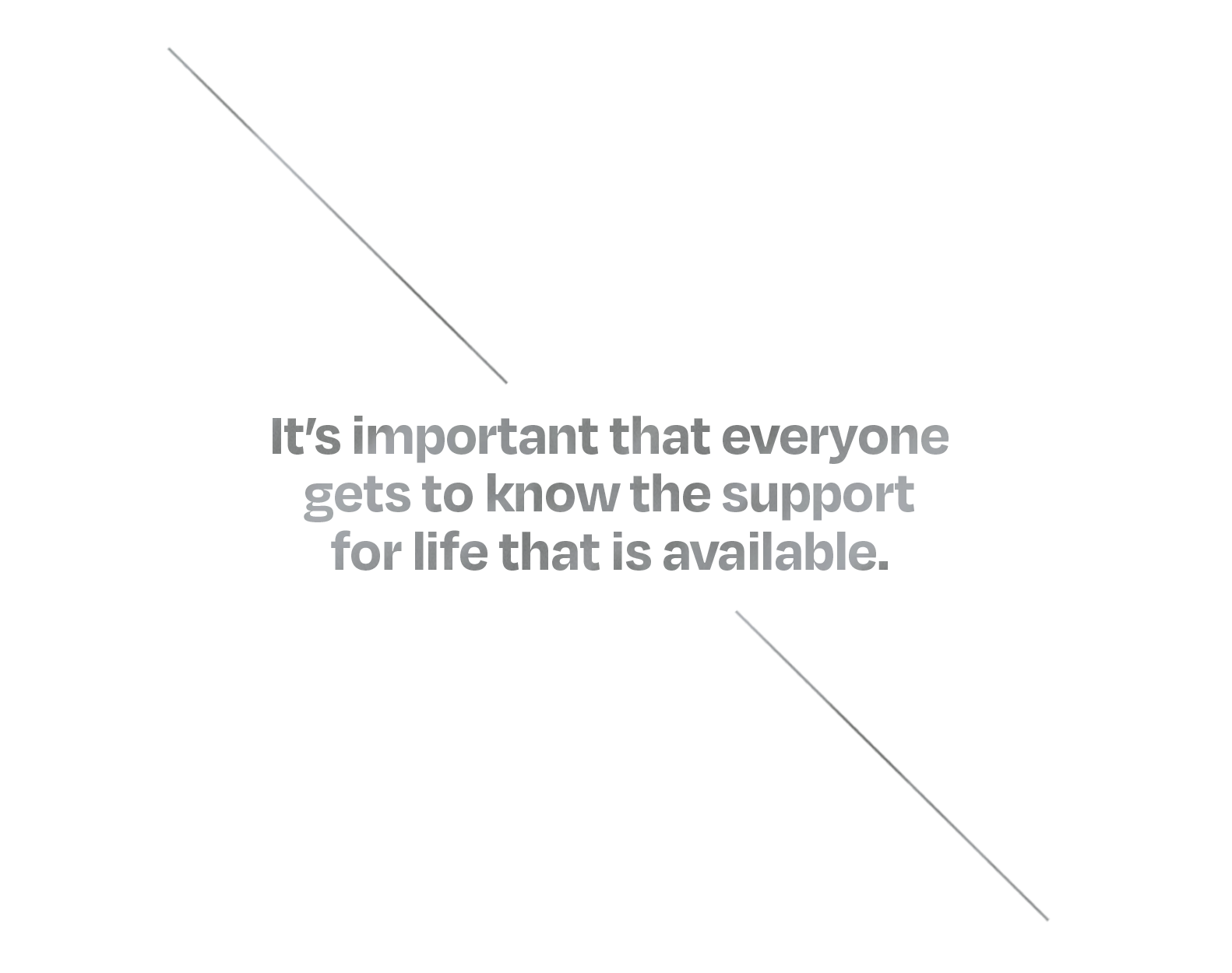For 49 years, the US protected abortion as a constitutional right.
All this changed on June 24, with the overturning of the landmark Roe vs Wade ruling by the Supreme Court.
The implication of this is that the legalisation of abortion can now be decided by individual states, which could move to enact bans.
On the streets, protestors expressed their displeasure. And on social media, people spoke openly about their disappointments.
Living in a country where abortion has been legal since 1970, does Roe vs Wade even matter to us?
And as Christians, how should we be approaching the issue of abortion?
There is a need to ask tough questions, wrestle with perspectives and formulate a view on something that matters greatly to the Lord.
After all, lives are at stake here.
Thir.st spoke to:
- Ps Debbie Ng (DN), Pastor of 3:16 Church and co-founder of Heartbeat Project, a ministry that champions women and children in vulnerable positions including those facing unplanned pregnancies and those hurting from abortion.
- Dr Vincent Chia (VC), a family physician with a special interest in bioethics and philosophy, and the founder of Doctors for Life (Singapore).
- Daniel Lim (DL), whose mother narrowly escaped being aborted. He is also a father of 2.
Here are some key points from the discussion, which cover healthcare, moral and pastoral perspectives.
1. Is this an issue of a woman’s right to choose vs a child’s right to live?
DN: It should not be a debate on whose right is more important. Both lives are important, and we must do our best to protect both.
Those who are arguing only from a woman’s right perspective tend to present their position and make it about choice.
However, the issue here is not if women should be able to choose generally, but whether a woman’s right to choose can come at the expense of another life.
We can also agree that the law prohibits certain choices, e.g. cheating, stealing.
This isn’t about taking away a woman’s right to bodily autonomy. It’s giving due weight to the other body in the pregnant woman — the child’s body.
For those of us who subscribe to a biblical worldview, it’s important for us to recognise the sanctity of life in the womb.

VC: Does the right to autonomy trump every other moral principle?
The right to life is the most basic right of every human being because without it, you don’t have access to other rights. Personal autonomy is just one aspect of any ethical consideration.
For those who say that the right to bodily autonomy for women trumps all other rights, this is a belief in what we call a radical, absolute right to bodily autonomy.
Making the right to bodily autonomy the ultimate consideration in bioethics is not only radical, but also very imbalanced.
Even current medical practices and the law do not recognise that. An example would be the treatment of acne with Accutane (Isotretinoin).
There is a guideline from the National Skin Centre that says that you need to have strict contraception and not be pregnant prior to starting this medicine, throughout the course of treatment and immediately after. This is because the drug causes cleft lip, eye and ear defects, and mental retardation in the foetus.
This guideline, at least in principle, is to protect the unborn child, and implicitly recognises the right of the child not to be harmed as a distinct, living and whole human being.

DL: This whole Roe vs Wade incident should lead us to think deeper: What is the highest virtue we are seeking in life?
If we see human individualism and expression to be the highest virtues in life, then pregnancy can be easily perceived in certain circumstances as problems to be terminated to preserve the mother’s freedom of expression.
However, if life is seen as the highest virtue, then pregnancy, which harbours a gift of life, is something to be protected as far as possible.
2. There are comments that the US seems to have gone back in time with this decision. What are your thoughts?
DL: If you look at this from the perspective of having better medical science and a deeper understanding of human development today, it could even be seen as progress because we start to see pre-born people for who they are.
When Roe vs Wade first came into being, medical science was not so advanced.
Perhaps many people didn’t quite understand how foetuses develop, haven’t seen ultrasound pictures or didn’t have such clear imaging as we have today.
Even today, it’s still quite easy for people to think of foetuses as just a set of cells.

When my wife and I found out about our first child’s conception, it did not register intuitively in me that a tiny human being is now developing in my wife’s womb.
The reality hit me mightily when I first heard my kid’s heartbeat and saw her through an ultrasound scan at about 6 weeks into the pregnancy.
This conviction only grew deeper as I saw my baby increasingly develop into a recognisable human form at about 11 weeks onwards, and seeing her yawn and stretch like any regular child would during an 18th week scan.
Without all these, honestly it can be quite easy to overlook the fact that actually the pre-born are also human life. They will develop into fully formed humans if we just give them time.
3. What’s wrong with just retaining the freedom of choice instead of passing laws that regulate abortion?
VC: Laws profoundly affect societal notions of what is morally acceptable and what is morally forbidden or required.
If you think about it, a lot of current laws in various countries regulate our own personal autonomy as well.
We have no right to take illicit drugs in the privacy of our room. We have no right to kill our children or torture them, or to do anything to our domestic helpers in the privacy of our home. We have no right to drive at 200kmh down the highway.
We have the right to choose, but it has to be within the confines of not harming our fellow human beings.
Ultimately, we have to recognise that women have the right to choose what is being performed to their bodies, but it must be in consideration with other moral and ethical principles.
Statistics also show that after the liberalisation of the law to allow abortion, the number of abortions have risen sharply. This is one of the effects of signposting via legislation, which leads to a societal perception that abortion is morally acceptable.
In Singapore, a study by K Singh et al showed that abortion rates rose tremendously after the liberalisation of abortion, peaking in 1985 when 35% of all pregnancies were terminated. Similar statistics could be produced from other countries such as the US.

DL: No one has absolute freedom of choice to do anything and everything desired. We are all equally subject to state laws that serve to protect the fundamentals and people in our society.
It has been often said that abortion is healthcare, but there is little awareness of what abortion actually does or seeks to accomplish.
Abortion seeks to terminate the life of the pre-born.
When people realise what abortion actually does, perhaps the entire conversation will then shift to whether or not a pre-born being is a person and thus entitled to the right to life?
4. How about women who need to terminate their pregnancies for medical reasons?
VC: There’s a distinction between “direct abortion”, which is the direct, intentional killing of a living human being, and “therapeutic abortion”.
Even the term “therapeutic abortion” technically is a misnomer. It’s not abortion — it’s a procedure to save the woman’s life that results in the unintended loss of the foetus.
Such bioethical dilemmas are assessed with the principle of double effect, which evaluates the intention, purpose and consequences of the moral action.
Should we allow both the mum and child to die, or should we at least save the mother?

In the case of, say, an ectopic pregnancy, the medical procedure is morally justified.
This is because, instead of allowing both the woman and foetus to die because of the eventual rupture of the fallopian tube, the procedure saves the woman’s life. The loss of the pre-born child is unintended.
Besides, the majority of pregnancy complications requiring surgical intervention happens in the second half of pregnancy where the foetus is already viable.
Simple emergency delivery of the intact baby to save the mother’s life makes perfect sense instead of terminating the life of the child.
5. Some have said that with abortion bans, women would find unsafe ways to abort. What about the healthcare argument?
VC: If we look at Roe vs Wade, it was primarily framed based on a medical myth.
It was usually touted that laws allowing abortion were to save women from unsafe back-alley abortions. But the science and the statistics have shown that it’s inaccurate and flawed.
Even prior to Roe vs Wade, illegal abortions were not unsafe because of:
- the advent of antibiotics to treat complications and infections; and
- the fact that they were performed, not by men in the back alley with rusty coat hangers, but by medical professionals in good standing within the community.
Medically speaking, abortion doesn’t treat any pre-existing disease.
In fact, abortion can cause harm to women. Data shows that abortion has a tremendous traumatic effect on their mental health.
DL: Any plans to restrict abortion needs to also regulate such areas to prevent unsafe self-medication. Supportive alternatives must also be promoted to help these women in despair make life-giving decisions.
Beyond debating about restrictions on abortion, what we as Christians can do if we truly care for women’s health, is to also tackle the issue of rampant unplanned or unwanted pregnancies.
We must understand what makes pregnancies unwanted in the first place and solve the challenges that lead to a demand for abortion.
Unhealthy male sexual behaviours and attitudes must also be addressed.
Unplanned pregnancies should not be the burden and responsibility of only women. Men must be held accountable too.

6. What happens then to the women who are victims of crimes such as rape?
DN: It’s important to empathise, journey and care for them. The rapist should also be persecuted to the fullest extent of the law. However, in this tragic situation, the taking of an innocent life doesn’t undo the rape.
It has also been reported that 1% of women in the US obtain an abortion because of rape. That should be considered in policy decisions that are made for the common good of society.
It’s important to consider if two wrongs will make a right. The intentional taking away of a human life through an abortion comes with serious emotional and mental repercussions.
It does not heal the victim directly of what she went through and may compound additional trauma instead.
DL: Rape violates a person deeply. Such a traumatic event can plunge a person into a deep vortex of pain and torment. We must remember that the victim has already suffered very much.
Yet in all these, as Christians, we trust that we have a God who loves us deeply and can turn even the worst situations around into life-giving ones.
It’s difficult to imagine, and impossible by our efforts alone. But with God, all things are possible.
When we hear testimonies of children conceived through rape and of their mothers, each one demonstrates hope beyond very difficult situations.
7. How can we support a friend considering abortion?
DN: Having spoken to many post-abortive men and women as well as those who considered abortion, their stories often reveal that abortion was not an option they naturally desired, but a result of circumstances they faced at the point of time.
Under these circumstances, the pre-born child appears to be the problem to be solved. But when they are able to take time to process, they realise that there are other choices that they can make and there are available resources to help them.
God has made us in His image, and we have a sense of that value revealed to us through creation (Romans 1:20).
I use a simple acronym “LIFE” to give practical handles on how to support a friend considering abortion.

Men also play an important role in an abortion decision.
When the father of the child decides to actively come alongside the pregnancy, he brings encouragement and instills courage. Saying “I’m going to take responsibility for our child” makes a huge difference.
We cannot just have a pro-birth culture — we need to build a pro-life culture.
In addition to helping women in unplanned pregnancies, the Church should continue to support a culture of life by offering practical help to women after they have given birth.
This includes supporting single mums, post-abortive men and women, children with special needs, and fostering.
8. Any final remarks?
DN: It’s a misconception if churches think that their young people hold a biblical worldview to life and abortion.
Our experience from speaking in churches aligns with an Institute of Policy Studies survey, which found that 2 out of 3 young Christians in Singapore say that abortion is acceptable most of the time.
So within the Church, it’s not wrong to say that there may be a pro-abortion culture among the young people.
As Christians, we need to have a clear conviction on when life begins, that the pre-born child is a life worth saving.
Holding conversations and teaching about sexual purity, life and abortion is needful.
Hearing testimonies of those who experienced a teenage pregnancy or those who experienced trauma after abortions can also provide real-life examples on how we can respond to those in similar situations.
It’s important that everyone gets to know the support for life that is available.
Here are some resources that champion the culture of life:
- For Christian equipping on life and abortion: Heartbeat Project
- For women facing unsupported pregnancies: Safe Place
- For women who have gone through an abortion: Buttons Project

DL: One of the loving things we can do is to not be ashamed of what our faith actually talks about — the value and dignity of every life, and the good that we do to try and help people.
Even though our friends might not be going through unplanned pregnancies right now, if the time comes, they might actually remember that they have a friend who cares about this.
We don’t have to make a post and say “I’m pro-life” or to debate everything.
The lowest-hanging fruit that we can do for a culture of life is to share stories and initiatives, or maybe even donate or volunteer.
There are so many ways we can help.
As you formulate your stance on the matter, we encourage you to seek a better understanding on the issue of abortion.
Consider too how God sees life. He has great plans to use all of his creation mightily.
“For you created my inmost being; you knit me together in my mother’s womb.” (Psalm 139:13)
“My frame was not hidden from you when I was made in the secret place, when I was woven together in the depths of the earth. Your eyes saw my unformed body; all the days ordained for me were written in your book before one of them came to be.” (Psalm 139:15-16)
There is no condemnation. There is always hope.
- What do you see as the highest virtue in life?
- How does what you know about God and His Word shape your own views on abortion?
- What are some ways you can help build a culture of life?
- Do you know someone who might need your support? How can you reach out and journey with them?









